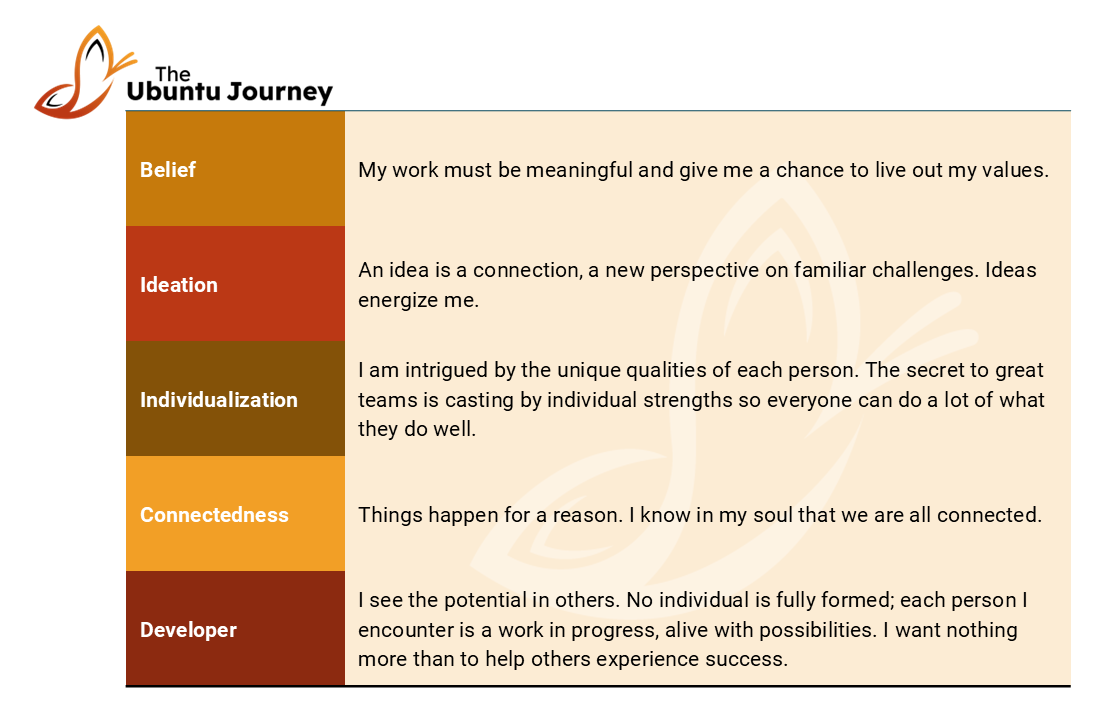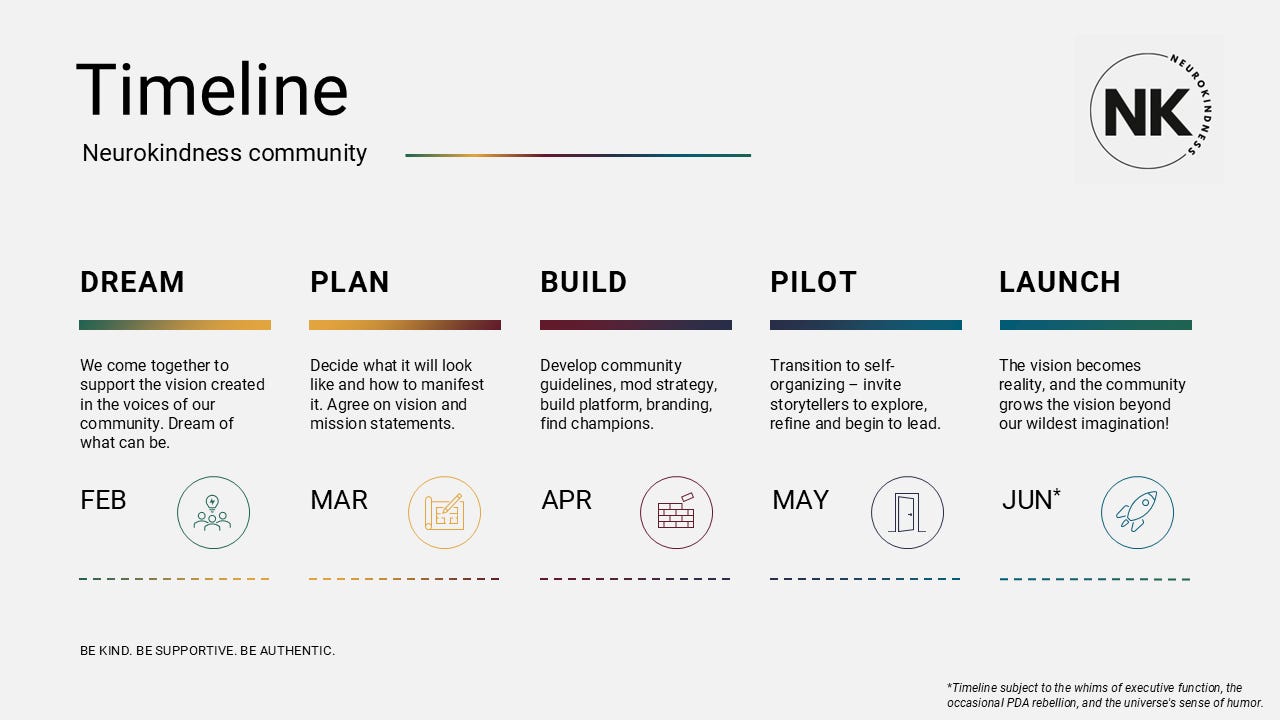Not long after I identified my neurodivergence and began exploring its meaning in how I engage with myself and the world around me, I began to identify the gaps. The edges and lines, the holes and voids. The places where society's expectations and the neurodivergent community fall apart, shred, and disintegrate.
So many of these gaps need our voices to be loud. Profound autism. The urgent struggle of families with autistic parents raising autistic children in the face of societal judgement and inadequate support. Autistic children who grow up to be autistic adults and age out of support. Autistic adults who cannot get hired.
I needed a place to start. The gap I resonated with most didn't seem as important. But it was a gap that was meaningful for me, one that I understood better than the others, and one that I was uniquely suited to exploring and perhaps addressing: the gap in support for career professionals as they identified their autism in adult life. A small subset of people aligned with my positionality.
That is the moment some of the most brilliant thought leaders and unnoticed experts I’ve met experience perhaps the biggest storm of their adult lives. In the crucible of burnout and screaming to be seen and heard, they stumble, trying to meet expectations that were never designed for their neurotype, perhaps managing none of it, becoming unable to work in traditional systems. That was my mother. That was almost me.
What if it wasn't a storm, but a metamorphosis?
And no one witnesses this moment. Their worth and wisdom remain unseen, though they exist just as powerfully as before.
But what if...
What if we saw that burnout and recognized it for the transformative potential of the moment? What if, with self-identification or diagnosis, there weren't just questions, but answers? What if in the search for answers to "Who am I really?" there were also answers to "How do I be me really?" What if instead of asking, “How can I help you?” we asked, “What can I teach you?” What if instead of measuring worth by productivity, we valued presence, perspective, and the power of simply being authentically ourselves? What if it wasn't a storm, but a metamorphosis?
I began to ask around at the end of last year. What were others doing in this space? Was the gap I wanted to focus on already being addressed? I found autistic people who had started businesses focused on encouraging employers to hire and create neurodiverse teams. I found employers featuring neurodiversity initiatives, many of which fell short of creating true diversity. I found communities of exhausted, late diagnosed adults. And I found Nick.
When Nick and I started talking, I just wanted to understand his focus. It didn't take but a couple of minutes to see that we had very similar, if not identical, values and beliefs, and that we wanted the same thing for our community. We each sought this from the very core of our own identities. When he invited me to join him, Kelly, and Sher, I knew this was my path.
"What will it take for you to feel a sense of belonging?"
I've spent several months working to understand what the Neurokindness Community means for me. I came to this freshly diagnosed, exploring my own identity, working with people I don't know in a way of working I've never experienced. I’m trying not to repeat old patterns unintentionally but to use my expertise and experience and passion to support us all.
A couple of weeks ago, I was talking to my coach about my excitement and anxiety around the Neurokindness Community. We talked about how important it is to me for every person who comes into the community to feel a sense of psychological safety and belonging. Great coach that she is, of course she asked the question: "What will it take for you to feel a sense of belonging?"
And great client that I am, I spent the next two weeks avoiding answering this question. Instead, I spent some time considering why I'm doing this.
…fulfillment and belonging are not the same thing, and this is where I find the anxiety sitting…
Last fall, I retook the CliftonStrengths assessment. It occurred to me that during my original experience with the Strengths Finder assessment, I was masking when I answered the questions, and I was curious how the results might change.
So here are my strengths when I answer the questions from the perspective of who I truly want to be, rather than who I think the world wants me to be.
As I reflect on these strengths, I realize they're not just personal attributes but the very foundation of what makes the Neurokindness Community possible – a space where values matter, where ideas flourish, where individual differences are celebrated, where we understand our connectedness, and where we help each other develop.
Nothing could be more aligned with the moment I find myself in than the Neurokindness Community. This is where I am meant to be at this time. What I am meant to do. But fulfillment and belonging are not the same thing, and this is where I find the anxiety sitting, waiting for me in the dark shadows of my memories.
Every time I've stepped into a role of leadership at any level, I've found myself outside of the group. Removed. Unable to benefit from the very service I commit to providing. Facilitating the enjoyment and growth of others, while working myself to exhaustion. Emotionally responsible, but not emotionally supported.
Every time I have a difference of opinion with the team, the rejection sensitivity rears its head. This is the moment they are going to decide I'm not aligned with this vision and tell me I'm not wanted. This is the moment they are going to just stop talking to me. They won't kick me out, they’ll just decide it is easier not to include me.
But that isn't what happens. Far from it. What happens is clarifying questions. What happens is creating space for our executive functioning challenges on any day. What happens is acknowledging the Pervasive Drive for Autonomy (PDA) or dysregulation or Rejection Sensitive Dysphoria (RSD) that woke up with us that day. What happens is, "Well done bringing this up Amber!! Good to work thru now." What happens is kindness.
So, what will belonging feel like for me? Trust. I don't mean others trusting me, although that is important too. It will feel like me trusting the people around me. My community.
When you come into the Neurokindness Community, you are a leader too. Leadership here isn't defined by employment status, productivity, or traditional metrics. It's about sharing your unique perspective, offering your authentic self, and being present in whatever way works for you. Each one of us will show all of us the way forward through our lived experiences and collective wisdom. I'm not going to be on the outside watching. As Nick says, "It's a 'we' thing." We're in this together."
If you're navigating the aftermath of an adult autism diagnosis, feeling caught between burnout and transformation, know that you're not alone.
This is why the Neurokindness Community feels different. It's not just another support group or professional network—it's a place where our neurodivergent strengths are recognized as valuable leadership qualities. Where our differences are deeply valued as the very insights needed to create meaningful change.
If you're navigating the aftermath of an adult autism diagnosis, feeling caught between burnout and transformation, know that you're not alone. The storm you're weathering can become your metamorphosis—not just in how you understand yourself, but in how you contribute to the world.
The Neurokindness Community is creating spaces for authentic connection, learning, and mutual support. We're building the resources I wish I'd had when I first began this journey.
Belonging isn't about fitting in – it's about being trusted for exactly who you are. It's about bringing your whole self to a community that needs precisely what you have to offer. And sometimes, it's about creating the very space you've been searching for.
This is coming soon. We will open the door fully in a couple of months, and I invite you to join us. Not as a follower, but as a fellow contributor. Not as someone defined by your productivity or employment status, but as someone whose unique existence and perspective might be exactly what another person needs to experience. Your value is intrinsic - not tied to what you do, but to who you are.
The gaps I first identified aren’t just voids – they are spaces of possibility. And together, we're filling them with kindness.
Footnote:
It’s always risky sharing a schedule, because it sets expectations that might not be met. So please allow us grace – the timeline embedded above is subject to the whims of executive function, the occasional PDA rebellion, and the universe's sense of humor. If we're late, it's not because we don't care – it's because we care enough to launch when we're truly ready.




I love this post Amberhawk - thank you.
I am really looking forward to the launch of the Neurokindness Community 💜
I see myself in this writing so much. I don't want to be a leader per se but I very much want to co create with other kind divergents in a way that spreads loving kindness vastly.